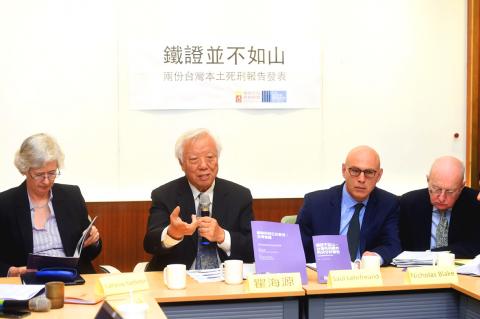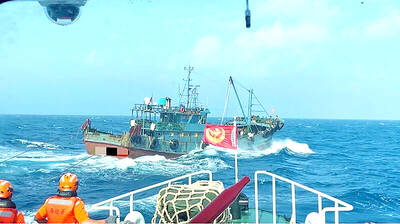Newly published research found most Taiwanese have limited knowledge about the death penalty and have a shifting attitude toward its abolition, the Taiwan Alliance to End the Death Penalty and the UK-based Death Penalty Project said yesterday.
While the government has long procrastinated about abolishing the death penalty on the grounds that the majority of the public opposes it, a new report revealed a more complex picture, the alliance said.
The report, For or Against Abolition of the Death Penalty: Evidence From Taiwan, based on a survey conducted from 2013 to 2014, found that “members of the public have very limited knowledge about the practice of the death penalty in Taiwan and abroad, yet their knowledge affects whether they support abolition,” said Chiu Hei-yuan (瞿海源), an honorary professor at Academia Sinica’s Institute of Sociology who conducted the research.

Photo: Chien Jung-fong, Taipei Times
Respondents were asked to answer four factual questions about the death penalty.
More than half, or 55 percent of the respondents, failed all four, while only 0.2 percent answered all of them correctly, he said.
While 88 percent of respondents oppose abolition, the number dropped to 82 percent if they were first asked questions about their trust in the judicial system and tested on their knowledge about the death penalty, he said.
Moreover, when given detailed scenarios to consider whether a defendant should be given the death penalty, respondents who support it dropped significantly.
For example, when asked if a poor man who accidentally killed a homeowner during a burglary should be sentenced to death, only 33 percent of respondents said “yes,” he said.
Instead of basing its policies on general public opinion, “the government should take a closer look into it and plan its policies based on a subtle understanding of public opinion,” he said.
Meanwhile, another report, entitled Unsafe Convictions in Capital Cases in Taiwan, conducted by University of Oxford professor Carolyn Hoyle, reviewed 62 cases of capital convictions from 2006 to 2015 and found 10 judgements to be “seriously flawed,” Death Penalty Project coexecutive director Saul Lehrfreund said.
Errors found in the cases include torture of suspects while in police custody, failure to collect and preserve evidence, and failure to establish an intent to commit murder, he said.
No matter how well-developed, resourced and sophisticated a criminal justice system may be, it cannot eliminate human errors, he said.
“Once the inevitability of error is accepted, the question is not whether an individual deserves to be sentenced to death and executed, but whether the state maintains the right to deprive an individual of the most basic human right, namely the right to life,” he said.
The reports show that public opinion on abolition is ever-shifting and never black-and-white, British Representative to Taiwan Catherine Nettleton said.
“Public opinion was used as an argument against abolition in the UK when it abolished it half a century ago, but today death penalty just does not come up as an option in the mind of a British person,” she said.
Hopefully, the reports would provide evidence for more objective discussion on abolition, she said.
“We firmly believe the death penalty should have no place in a democratic and human rights respecting society such as Taiwan,” she added.

The Republic of China (ROC) is celebrating its 114th Double Ten National Day today, featuring military parades and a variety of performances and speeches in front of the Presidential Office in Taipei. The Taiwan Taiko Association opened the celebrations with a 100-drummer performance, including young percussionists. As per tradition, an air force Mirage 2000 fighter jet flew over the Presidential Office as a part of the performance. The Honor Guards of the ROC and its marching band also heralded in a military parade. Students from Taichung's Shin Min High School then followed with a colorful performance using floral imagery to represent Taiwan's alternate name

COGNITIVE WARFARE: Chinese fishing boats transmitting fake identification signals are meant to test Taiwan’s responses to different kinds of perceived incursions, a report said Chinese vessels are transmitting fake signals in Taiwan’s waters as a form of cognitive warfare, testing Taipei’s responses to various types of incursions, a report by the Institute for the Study of War said on Friday. Several Chinese fishing vessels transmitted fake automatic identification system (AIS) signals in Taiwan’s waters last month, with one mimicking a Russian warship and another impersonating a Chinese law enforcement vessel, the report said. Citing data from Starboard Maritime Intelligence, the report said that throughout August and last month, the Chinese fishing boat Minshiyu 06718 (閩獅漁06718) sailed through the Taiwan Strait while intermittently transmitting its own AIS

CHINESE INFILTRATION: Medical logistics is a lifeline during wartime and the reported CCP links of a major logistics company present a national security threat, an expert said The government would bolster its security check system to prevent China from infiltrating the nation’s medical cold chain, a national security official said yesterday. The official, who wished to stay anonymous, made the remarks after the Chinese-language magazine Mirror Media (鏡周刊) reported that Pharma Logistics (嘉里醫藥物流) is in charge of the medical logistics of about half of the nation’s major hospitals, including National Taiwan University Hospital and Taipei Veterans General Hospital. The company’s parent, Kerry TJ Logistics Co (嘉里大榮物流), is associated with the National Committee of the Chinese People’s Political Consultative Conference (CPPCC) and the Chinese People’s Liberation Army (PLA), the

COVETED PRIZE: The US president would be a peace prize laureate should he persuade Xi Jinping to abandon military aggression against Taiwan, William Lai said US President Donald Trump should get the Nobel Peace Prize should he be able to convince Chinese President Xi Jinping (習近平) to abandon the use of force against Taiwan, President William Lai (賴清德) told a conservative US radio show and podcast in an interview. The US is Taiwan’s most important international backer, despite the absence of formal ties, but since Trump took office earlier this year he has not announced any new arms sales to the nation. Trump could meet Xi at the APEC summit in South Korea on Oct. 31 and Nov. 1. Lai, speaking on The Clay Travis and Buck Sexton